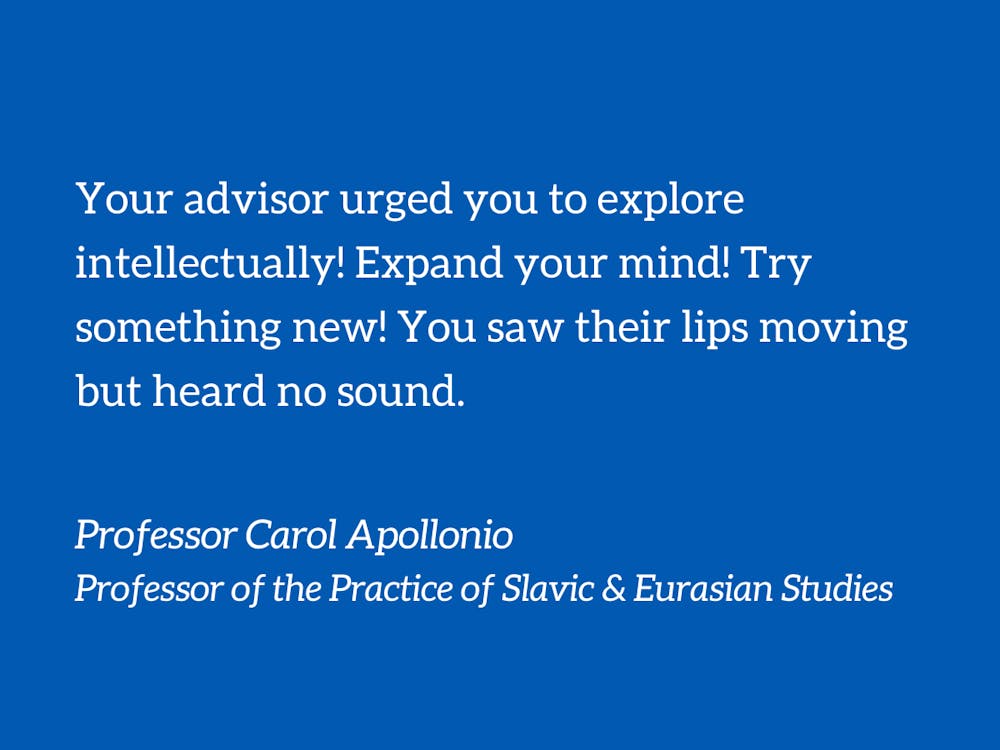We have a new curriculum!
When it comes to the classes you have to take during your brief time in our clutches, I’m guessing that the views from the two sides of the podium have differed radically.
On your side: a guide to achieving — or a series of obstacles standing in the way of — success, glory, wealth and happiness. Over here: an exciting array of intellectual opportunities — or a set of conditions to meet to fill our classrooms or clear them of weeds.
Over its 24 years of life, the old Curriculum became cumbersome. Those weird little codes (“MOI”) became mere sound and fury, signifying nothing. Registration became an exercise in getting requirements out of the way and building credentials, on the one hand, and finding easy, low-demand classes on the other.
Your advisor urged you to explore intellectually! Expand your mind! Try something new! You saw their lips moving but heard no sound.
To judge from conversation shreds that I overhear on the quad, students spend an awful lot of time ranting about grades, their GPA, micro-points that have been unfairly deducted, the injustice of this or that professor’s grading standard, and the frenzied quest for A’s in everything. I hardly ever hear excited discussions of class content.
The second dominant theme, intertwined with this one, is about the relationship between coursework and future careers. As the this-side-of-the-podium people have assumed, these twinned concerns have played an outside role in how students select their courses. I was in a salon off campus one time (yes, this does happen occasionally). The person making me over told me about a bunch of young ladies who had come in to get fixed up for some fancy campus event. One of them spent her entire haircut in a rage: “My dad didn’t spend all that money for me to come to Duke just for that professor to give me an F,” she ranted.
We don’t seem to get too much of that kind of complaint relating to our Russian literature classes, but of course, how would I know? Every April, your professors suit up for those painful moments when students realize their grade might be hovering around an 89.4 or a 91.3 or a 72. They will be dropping in for a friendly visit, to let us know how much they love the subject and our class in particular, despite difficult circumstances.
The most memorable cases of this kind are those where a student comes in with a 59.4. These, honestly, are some of my most interesting students, though I haven’t always seen much of them during the regular semester. Decades of experience tell me that they might have a very bright future.
I had one advisee 10 years ago whose end-of-sophomore-year transcript was a thing of beauty: literally nothing but Cs in every class. Every single class, and not C+ or C-, no: 16 clean, round C’s. He had to have planned it, how could it have happened randomly? Great kid. A very fine mind. Loved Duke. The punch line is that he is making tons of money now in a career that he loves. Another kid, a humanities major with a string of Cs in my classes, came into my office with his eyes whirling around like pinwheels and asked me for a letter of recommendation. He giggled: “I just aced the LSAT. I guess I’m going to law school.” And he did.
They are out there now in the world, doing great. Still cool and interesting and resilient.
Where were we? Oh, the curriculum. Duke said, OK, enough, let’s start over. Could we make college a place where students expand their minds, spend time with the arts, ask big philosophical questions, and indulge in learning for the fun of it? Admittedly a wildly utopian project, aimed at overhauling an entire culture. Still, a brave, diverse faculty committee tackled the task. Toiling energetically over two action-packed years, they consulted students, colleagues and the community, and the result is your new Curriculum.
Sparking universal joy, the Committee cleared out the “Modes of Inquiry” alphabet soup, refocusing on the basics — the different forms of knowledge that are our core. Nothing has changed in the majors; what we now have is a simpler, more assertive focus on the liberal arts. Including, let us be aware, the Arts and Humanities. The common enemy is the mindset that has viewed non-major courses as obstacles, or as opportunities to pad the GPA.
The new curriculum challenges both students and faculty to rethink what we’re doing together. Yes, coursework does offer utility value, skills training for an unpredictable future. Your Certificates and Majors and Minors remain in place. But this moment offers an opportunity for all of us to reboot, to approach classes as a conversation, a feast of ways of thinking and being in the world. Shall we give it a try?
Professor Carol Apollonio has been teaching Russian literature at Duke for 40 years, and this is her final semester. Her column, "Final Rants from the Podium," typically runs on alternate Wednesdays.
Get The Chronicle straight to your inbox
Signup for our weekly newsletter. Cancel at any time.

